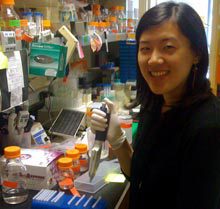Chen Chen L&S Sciences
The Effects of RNA Binding Proteins on Alternative Splicing of FGF Receptor 2
One of the most surprising conclusions to emerge from whole genome sequencing projects in the last decade is that all animals have roughly the same number of genes. Initially, this seems contradictory to the idea that higher organisms have more genes to account for higher levels of complexity. However, one potential explanation is alternative pre-mRNA splicing, through which different exon combinations are incorporated into mature transcripts, thereby increasing the number of proteins encoded by a limited number of genes. Although there have been extensive studies in vitro concerning the biochemical basis of what determines these combinations, in vivo studies have been much rarer. For my project, I will examine which RNA binding proteins (RBPs) regulate the alternative splicing of a particular gene, Fibroblast Growth Factor Receptor 2 (FGFR2). More specifically, I will examine the effects of different RBPs, whether as enhancers or silencers, on splicing in Xenopus laevis frog embryos. The two resulting isoforms, FGFR2b and FGFR2c, have very different ligand binding properties, with the variant I am interested in functioning primarily in mesoderm induction.
Message To Sponsor
It is difficult during the regular school year to focus my time on research and the SURF program allows me that exact opportunity over the summer. For this new project I am beginning, there are many laboratory procedures and protocols to learn. With this program, I am able to devote my time to learning these skills faster and more thoroughly. In addition, through applying for the program, I wrote my first research proposal, a challenging task that really forced me to understand and consider every aspect of the project. As I follow my proposed plan and hopefully obtain results throughout the next year, I will have the unparalleled experience of a research project in its entirety.